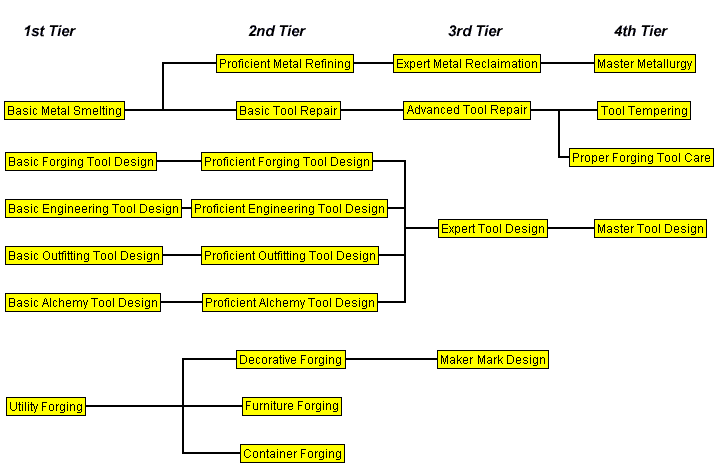Blacksmithing techniques: Difference between revisions
| Line 78: | Line 78: | ||
===Basic Alchemy Tool Design=== |
===Basic Alchemy Tool Design=== |
||
Common Alchemy tools become easier to forge with training in Basic Alchemy Design. |
|||
===Proficient Alchemy Tool Design=== |
===Proficient Alchemy Tool Design=== |
||
Revision as of 17:05, 18 July 2011
Techniques for the Blacksmithing discipline.

Techniques
Basic Metal Smelting
The concepts of Basic Metal Smelting reduce the difficulty of mixing metals in the crucible.
Proficient Metal Refining
Learning Proficient Metal Refining will reduce material losses sustained in the refining process, from 50% to 20%.
Expert Metal Reclaimation
The technique of Expert Metal Reclamation shall increase yields from smelting down forged goods.
Master Metallurgy
As a Master of Metallurgy, you work around metal impurities and produce higher quality products as a result.
Basic Tool Repair
Those trained in Basic Tool Repair will find a substantial increase to the amount by which they can repair items.
Advanced Tool Repair
Advanced Tool repair not only allows a Blacksmith to repair items, but also to guard them against damage for some time.
Tool Tempering
Applying the technique of Tool Tempering allows a greater increase in tool durability.
Proper Forging Tool Care
Proper Forging Tool Care teaches the blacksmith how to guard a tool against premature wear. Knowledge of this technique will reduce chance for tools taking damage, and totally prevent damage on newly repaired tools for two hours of logged in time.
Basic Forging Tool Design
Tools commonly used in the Forge can be created with ease once you know the Basic Forging Design principles.
Proficient Forging Tool Design
The Proficient Forging Design makes the process of forging secondary tools used in the forging process much easier.
Basic Engineering Tool Design
Basic Engineering Design principles will markedly increase your skill with forging these basic tools.
Proficient Engineering Tool Design
Basic Outfitting Tool Design
By learning the Basic Outfitting Design technique, your skill with forging the common outfitting tools is augmented.
Proficient Outfitting Tool Design
Basic Alchemy Tool Design
Common Alchemy tools become easier to forge with training in Basic Alchemy Design.
Proficient Alchemy Tool Design
Expert Tool Design
Requires all basic and proficient tool design techniques.
Some rare tools can be used across two disciplines, and those designs are made easier when you know about Expert Tool Design.
Master Tool Design
Exotic tools that double as weapons, or that can perform across multiple disciplines are taught with Master Tool Design.
Utility Forging
Forged goods that serve a wide range of utility purposes are made easier by knowing the Utility Forging technique.
Decorative Forging
Designing worn forged goods becomes easier when taught the Decorative Forging technique.
Furniture Forging
Learning the Furniture Forging technique improves your ability with making items for the home.
Container Forging
Advanced knowledge of forging containers will bonus your ability to make them.
Maker Mark Design
The technique allows the creation of maker's marks for marking crafed items.